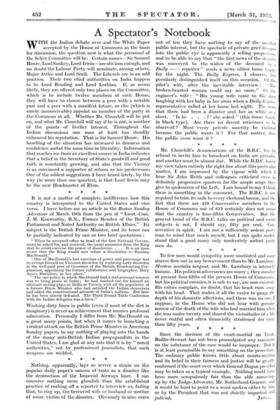It is not a matter of complete indifference how this
country is interpreted to the United States and vice versa. I have before me an article in the Boston Sunday Advertiser of March 19th from the pen of " Lieut.-Com. J. M. Kenworthy, R.N., Former Member of the British Parliament and Noted Authority on British Affairs." Its subject is the British Prime Minister, and its tenor can be partially indicated by one or two brief quotations :
" When he accepted office as head of the first National Govern. ment he asked for, and received, the usual assurance from the King that he could exercise the power of dissolution. . . . It is an open secret that the King would now refuse a dissolution to Ramsay MacDonald."
" One of MacDonald's last exercises of power and patronage was to avenge himself on Viscount Snowden by replacing Lady Snowden in the well-paid post of Governor of the British Broadcasting Cor- poration, appointing his former collaborator and biographer, Mary Agnes lamilton, in her place."
The one policy in which MacDonald had a real personal interest was to bring peace in India ; he had marked out for himself an ultimate resting place at Delhi as Viceioy with all the popularity of a former Prime Minister who had satisfied the Indian democrats and aided the constitutional advanf% of India's millions. But here he has been utterly defeated. The Third Round Table Conference with the Indian delegates was a farce."
Washing dirty linen in public (even if most of the dirt is imaginary) is never an achievement that arouses profound admiration. Personally I differ from Mr. MacDonald on a great many points, but when it comes to launching a virulent attack on the British Prime Minister in American Sunday papers, to say nothing of playing into the hands of the many anti-British Indian propagandists in the United States, I am glad at any rate that it is by " noted authorities," not by professional journalists, that such weapons are wielded.
* * * *








































 Previous page
Previous page